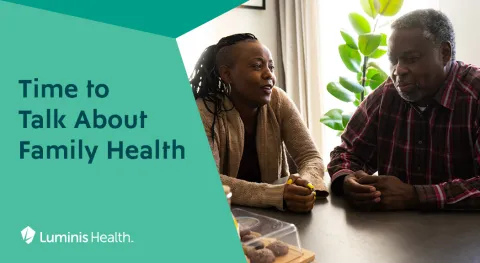Effective January 20, 2026, masks are encouraged for all staff, patients and visitors at all Luminis Health locations and will remain encouraged through the end of the influenza season. Thank you for your patience as we continue to care for our community.

Many patients ask how they can reduce their risk of developing ovarian cancer. Ovarian cancer is a topic of concern for women across the nation. Ranking fifth in cancer deaths among women, this type of cancer accounts for more deaths than any other type of cancer that forms in the female reproductive system, according to recent research by the American Cancer Society (ACS).
More than 22,000 women will receive a new diagnosis of ovarian cancer this year. Unfortunately, more than 13,000 will die from ovarian cancer. And although this cancer develops in older women – approximately 63 and older – it can happen to anyone regardless of their age. Luckily, research shows that the number of women diagnosed with ovarian cancer in the U.S. has been less over the last 20 years. But more needs to be done.
There has been a lot of focus on researching effective screening tests and finding new ways for early detection, as that could change mortality rates. But as organizations continue to do the legwork of research, there are several things women can do to take care of themselves and their bodies.
Although there is no direct method of preventing ovarian cancer, there are several prevention tips you can follow to reduce your risk.
- Consider genetic counseling. Especially as a woman with family history that suggests you could have a cancer syndrome that increases your risk of ovarian cancer. Genetic testing can help define if you (or even family members) carry certain gene mutations that lead to a higher risk of developing ovarian cancer.
- Take the pill. Taking a contraceptive pill for at least five years will reduce your chance of ovarian cancer by 50 percent. However, you should talk to your doctor first. Taking the pill can be beneficial in reducing the risk of ovarian cancer, but there are side effects you should know. According to the ACS, birth control pills may slightly increase the risk of developing breast cancer. Make sure to discuss the possible risks and benefits associated with taking the pill with your doctor first.
- Talk to your doctor about surgery. There are surgical procedures that can help reduce the chance of developing different types of ovarian cancer. Hysterectomy, tubal ligation, as well as removal of the ovaries, the fallopian tubes or the whole fallopian tube can all reduce a woman’s risk of ovarian cancer. However, these operations can have many side effects. Surgical interventions must be personalized based on personal and family medical history.
- Exercise regularly and eat nutritious foods. Maintaining a healthy weight and eating well can lower your risk of cancer. A good balance of fruits and vegetables can also contribute to a healthy weight, which is known to reduce the risk of developing cancer.
There is no one specific symptom women experience, but the most typical are feeling bloated and noticing a change in bowel habits. Symptoms are very vague and can often be overlooked or dismissed. If something doesn’t feel right in your body, that’s probably because something isn’t right. Don’t ignore the signs, especially if you have been noticing symptoms for a while and they continue to recur. Talk to your doctor and don’t be afraid to seek specialty care.
Gynecologic Specialty Surgeons provide preventive surgery for women at high risk of developing a hereditary type of gynecologic cancer. To book an appointment, call 443-481-3493.
Originally published Sept. 23, 2019. Last updated Sept. 3, 2020.



